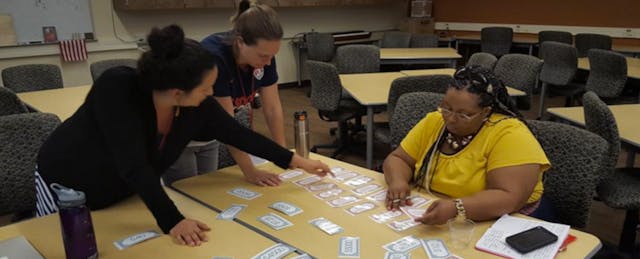Every year, the annual PBL World conference attracts educators far and wide to Napa, CA, to partake in five days of intensive training in project-based learning where they hear the latest news from authors and thought leaders, and attend workshops with edtech companies aligned to that pedagogy. But “far and wide” might not be a strong enough phrase to describe this year’s attendees, who hailed from six continents.
Since its inception in 2011, between 15-25% of PBL World conference attendees have been international visitors. According to David Ross, Senior Director of Partnerships and Outreach at Buck Institute for Education, this is the first time that there have been attendees from all six continents excluding Antarctica.
The fourth annual Buck Institute for Education PBL World is a five-day experience that attracted nearly 700 visitors over the course of one week. This year, about 22% of the visitors were from countries outside of the United States, and that number would have been even higher, except that the U.S. experienced delays in processing international visas, preventing many individuals from attending.
What drives so many foreign visitors to PBL World? Ross explained that there are three main ingredients in the BIE secret sauce for success to attract internationals. First is the concept of edu-tourism, and the brand-recognition and desirability of the Napa Valley.
Second is the timing of PBL World, which is deliberately scheduled each year during the week preceding ISTE, making the effort and expense of international travel easier to justify because visitors can stay in the United States for two internationally recognized educator conferences. PBL World ends at noon on Friday to accommodate the need for travels to get to the airport and onto the next adventure.
Third, and perhaps most vitally, is the prestige and reputation of Buck Institute for Education, which Ross calls the “Apple computer of Project-Based Learning” and has been a respected academic research institution on PBL since 1987.
The PBL Scene Abroad
EdSurge had the opportunity to speak with visitors from Taiwan and Japan who attended PBL World. Doris Tsuey-Ling Wu is the Chairperson at iEARN in Taiwan, and she is a huge advocate for the importance of an education which provides opportunities for students to experience project-based learning. Wu states that there are “120 schools doing PBL in Taiwan,” impacting between 3,000 and 4,000 students connected through iEARN.
The International Education and Resource Network, or iEARN, is a non-profit organization made up of over 30,000 schools and youth organizations in more than 140 countries. iEARN connects teachers and young people from around the world to collaborate in project work together, serving over two million students each day. Wu was first exposed to the Buck Institute at the 2004 iEARN conference in Slovakia where she discovered the texts published by BIE, and began her own project to get the BIE resources translated into Hokkien and Mandarin. The BIE project-based learning “Handbook” is now available in eight languages, including French, Spanish, Japanese, Mandarin and Gujarati.
Wu says that she “loves the BIE handbook, and it is exactly what she needs to help train others,” pointing to their detailed, specific, and well organized approach to explaining project-based learning. In April 2014, Taiwan hosted its first BIE PBL conference, which was attended by K-12 teachers, university professors, policy makers, and educational reporter from throughout Taiwan.
Kazuo Shimizu, a three-time visitor to PBL World from Japan, shared similar enthusiasm and optimism about project-based learning’s potential in Japan. Shimizu is the President of Project Management Intelligence, a nonprofit incubator which promotes the value of PBL through teaching high school students about project management. Shimizu believes that projects make a person better, that they are motivational, and help prepare students to live a full life. Currently, he sees evidence that parent and community resistance to project-based learning is going down. According to Shimizu, the Japanese Ministry of Education is developing a plan to redesign education systems in Japan, and is committing to a concept focused on “Active Learning” which is expected to be in place by 2020.
Project-based learning appears to be appealing to a larger international audience as educators strive to educate their students on how to be ready for our changing world, especially as it becomes more entrepreneurial and interconnected. The international attendees at PBL World seemed united in their belief that their students need an education focused on teaching students not just knowledge and content mastery, but also focused on equipping them to collaborate and create public products that apply learning to authentic challenges in the world they live.
Editor's Note: An earlier version of this story said that the PBL Starter Kit is available in 8 languages; it's only available in French and English. The Project-based Learning Handbook is available in 8 languages.


